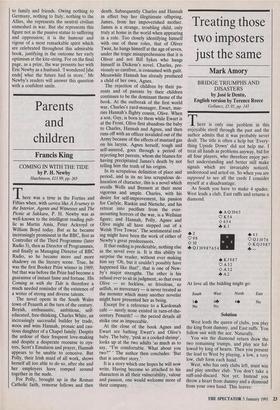Parents and children
Francis King
COMING IN WITH THE TIDE by P. H. Newby
Hutchinson, f13.99, pp. 265
There was a time in the Forties and Fifties when, with uovels like A Journey to the Interior, Agents and Witnesses and The Picnic at Sakkara, P. H. Newby was as well-known to the intelligent reading pub- lic as Martin Amis, Peter Ackroyd or William Boyd today. But as he became increasingly prominent in the BBC, first as Controller of the Third Programme (later Radio 3), then as Director of Programmes, and finally as Managing Director of BBC Radio, so he became more and more shadowy on the literary scene. True, he was the first Booker Prize winner in 1969; but that was before the Prize had become a guarantee of instant fame and fortune. His. Coming in with the Tide is therefore a much needed reminder of the existence of a writer of strong and diverse talents.
The novel opens in the South Wales town of Penarth at the turn of the century. Boyish, enthusiastic, ambitious, self- educated, free-thinking, Charles White, an increasingly successful builder by trade, woos and wins Hannah, prosaic and cau- tious daughter of a Chapel family. Despite the ardour of their frequent love-making and despite a desperate recourse to oys- ters, Scott's Emulsion and prayer, Hannah appears to be unable to conceive. But Polly, their Irish maid of all work, shows herself all too able to do so, after she and her employers have romped around together in the nude.
For Polly, brought up in the Roman Catholic faith, remorse follows and then death. Subsequently Charles and Hannah in effect buy her illegitimate offspring, James, from her impoverished mother. James is a strange, troubling child, only truly at home in the world when appearing in a role. Too closely identifying himself with one of these roles, that of Oliver Twist, he hangs himself at the age of seven, under the tragic misapprehension that it is Oliver and not Bill Sykes who hangs himself in Dickens's novel. Charles, pre viously so carefree, is consumed with guilt. Meanwhile Hannah has already produced a child of her own, Agnes.
The rejection of children by their pa- rents and of parents by their children continues to be the dominant theme of the book. At the outbreak of the first world war, Charles's yard-manager, Ewart, mar- ries Hannah's flighty cousin, Olive. When a son, Guy, is born to them while Ewart is at the Front, Olive first abandons the baby to Charles, Hannah and Agnes, and then runs off with an officer invalided out of the Army because of the effects of mustard gas on his larynx. Agnes herself, tough and self-assured, goes through a period of rejecting her parents, whom she blames for having precipitated James's death by not telling him the truth of his origins.
In its scrupulous definition of place and period, and in its no less scrupulous de- lineation of character, this is a novel which recalls Wells and Bennett at their most vigorous and ample. Charles, with his desire for self-improvement, his passion for Carlyle, Ruskin and Nietsche, and his retreat into pacifism from the ever- mounting horrors of the war, is a Wellsian figure; and Hannah, Polly, Agnes and Olive might all have stepped out of a Welsh 'Five Towns'. The sentimental end- ing might have been the work of either of Newby's great predecessors.
If that ending is predictable, nothing else in the novel ever is. It is this ability to surprise the reader, without ever making him say 'Oh, but it couldn't possibly have happened like that!', that is one of New- by's major strengths. The other is his refusal ever to sit in judgment, so that even Olive — so feckless, so frivolous, so selfish, so mercenary — is never treated as the monster which many another novelist might have presented her as being.
Except for a reference to a Kardomah café — surely none existed in turn-of-the- century Penarth? — the period details all strike one as impeccable.
At the close of the book Agnes and Ewart are bathing Ewart's and Olive's baby. The baby, 'pink as a cooked shrimp', looks up at the two adults 'as much as to say, "I'm comfortable. What about you two?" ' The author then concludes: 'But that is another story.'
It is a story which one hopes he will now write. Having become so attached to his characters in all their vulnerability, valour and passion, one would welcome more of their company.










































 Previous page
Previous page